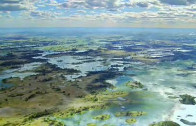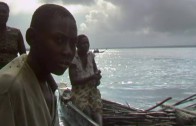Planet Earth — The Future
Following on from the series Planet Earth which looked at various forms of life across the globe, Planet Earth — The Future highlights the issues of conservation and the future of the environments and species featured in the Planet Earth series. Using interviews with the film-makers and eminent figures from the fields of science, conservation, politics, and theology, the series poses questions around the effectiveness of the environmental movement, and the future of the planet. A lot needs to change in order to ward off catastrophe…
Series
The first programme asks if there really is an extinction crisis facing certain species. Alastair Fothergill, executive producer of Planet Earth, admits that making the series was a bittersweet experience since some creatures were filmed with the knowledge that their continued existence is under threat. David Attenborough believes that conservation of the natural world is something that can unite humanity if people know enough about it. Cameraman Martyn Colbeck relates that every single day during a six-week African visit to film for “Jungles,” he and his crew were awakened by the sound of gunshots. Poaching can quickly wipe out a population, and David Greer of the World Wide Fund for Nature explains that in 2005 his team confiscated 70 guns in the area–a 700% increase from 1999. Other featured animals at risk include the Walia Ibex, the Snow Leopard, the boto, and saiga Antelope.
The second part looks at the dominant cultures detrimental effect on the world’s areas of wilderness. As the human population has grown, only a quarter of Earth’s land now remains uninhabited (aside from Antarctica). Although around 12% is protected, this is not enough. Ethiopia’s Semien Mountains are increasingly encroached upon for farming land, and this example leads to the question of overpopulation. Some interviewees argue that it is not just about numbers: how humans consume their natural resources is also important. However, others believe that the world would be greatly more sustainable if the population level was reduced to about half its current level. Jonathon Porritt believes that this could be achieved simply: by good education on family planning. Consumption of fresh water is highlighted–there are now 40,000 more dams in existence than in 1950. The controversy over drilling for oil in the Arctic National Wildlife Refuge is discussed by both its advocates and opponents. E. O. Wilson’s concept of biophilia is discussed, and David Attenborough believes that a child’s innate love of wildlife, for whatever reason, is being lost in adulthood. An answer to deforestation is found in Costa Rica, where farmers are paid to allow their pasture to revert to forest for its water ecosystem service. The programme also deals with climate change, which is now happening at a faster rate than ever before.
The last episode deals with the future of conservation. It begins by looking at previous efforts. The ‘Save The Whales’ campaign, which started in the 1960s, is seen to have had a limited effect, as whaling continues and fish stocks also decline. In the 1990s, as head of the Kenya Wildlife Service, Richard Leakey took on the poachers by employing armed units. Although it was successful in saving elephants, the policy was detrimental to the Maasai people, who were forced from their land. The need for “fortress” areas is questioned, and the recently highlighted Raja Ampat coral reef in Indonesia is an example. The more tourism it generates, the greater the potential for damage and inevitable coastal construction. Sustainable development is viewed as controversial–a contradiction in terms. Trophy hunting is also contentious. Those that support it argue that it generates wealth for local economies, while its opponents point to the reducing numbers of species such as the markhor. Ecotourism is shown to be beneficial, as it is in the interests of its providers to protect their environments. However, in some areas, such as the Borneo rainforests, the great diversity of species is being replaced by monocultures. Can we turn this around as a people?




